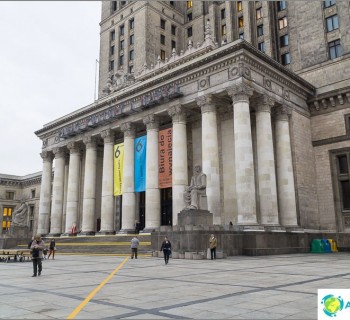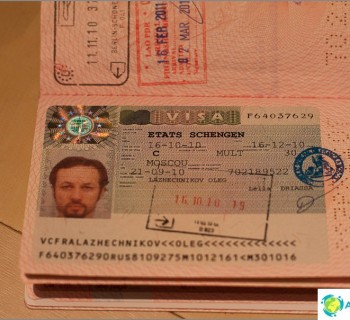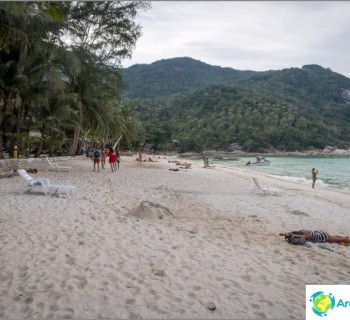Surprisingly, many were interested in my recent experience of going through a retreat (almost Vipassana) on Koh Samui. I was told that recently such events have become more private and fashionable, but I did not think that almost everyone had already heard anything about it. When I learned about retreats 5 years ago, then so few people knew about it even remotely..
I ask you to be condescending to my post and the thoughts in it. This is my first retreat experience, although I have been thinking about eternal questions and practices for a long time. Perhaps to someone all this will seem nonsense, to someone incorrect interpretations, just remember we all have our own perception of the world and our explanations, we are all different. I tell my only my experience / thoughts and only what I learned about this week. This is not an informational post..
The content of the article
- one About everyday life and the event itself
- 2 Briefly about meditation
- 3 My impressions and experiences
- 4 On the map
About everyday life and the event itself
Vipassana means seeing things as they are. And it seems like it's not entirely correct to say «was in Vipassana» or «practiced Vipassana». But the common people say so often, and Google now also tells me that this is a kind of meditation technique, meditation courses. But come on, let's not go into terms and definitions. The event itself, where I was, is called a retreat, and the meditation technique that we have been practicing is Anapanasati (the practice of mindful breathing). That is, it is not really Vipassana, but somewhere nearby. Our teacher said that there are different practices, one is more suitable for someone, for someone else..
Russian-language retreats are also held in the Moscow region (Goenk centers), but I was not able to get there. I will not say that I was particularly eager, because if I burned, I would have gotten into it, probably. There are just a lot of participants, you need to sign up strongly in advance, and the seats run out within a few minutes after the start of online registration. At least that was the case before. For several years I completely forgot about the existence of retreats and my desire to get there. And then I drew a trip to Thailand and quite by accident in the Vkontakte group they threw me a link to the Dipabhavan meditation center. It turned out that exactly at the time when I was on Koh Samui, a retreat would be held in Russian (my understanding of English is not good), right on New Year's dates. Everything just fit perfectly into my route, I could not help but go there. Moreover, I am very calm about the New Year's celebration and was glad that I could meet him far from Olivier and monotonous congratulations. Plus, it turned out quite symbolically, as they say, as you celebrate the New Year, you will spend.
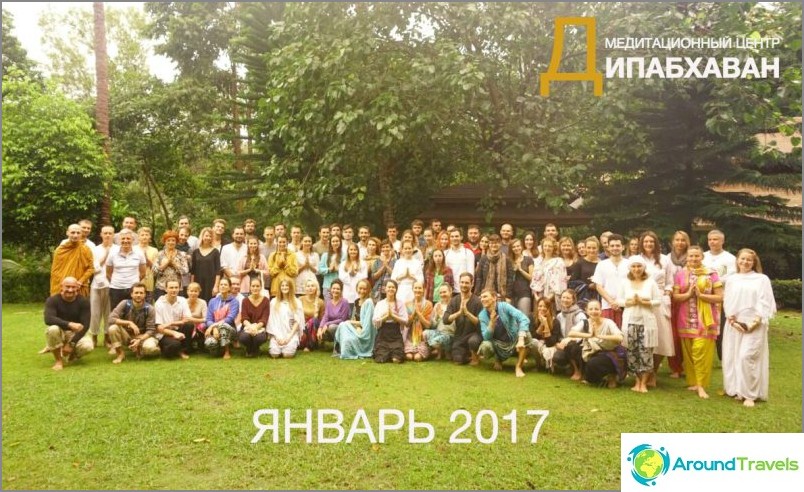
All participants of the New Year's retreat on Koh Samui
So, the retreat began on December 31st on Koh Samui, Thailand, near Lamai Beach. There were almost 90 of us. Those who decided to celebrate the New Year in this way. I thought there would be a lot fewer of us. At the beginning there was a mini-interview, where they once again told about the rules of conduct in the retreat center (to be silent, do not consume substances, follow the obligatory daily routine) and asked about their intention to go through the retreat to the end. It is unlikely that someone did not pass the interview, but once again you could understand for yourself whether it was worth it. Then they took all the equipment from us and settled in the dormitories, separately for men, separately for women. Since I didn't have a camera, all the photos were taken on the last day before leaving..
After an introductory lecture and a short sightseeing tour of where everything is, the rule of silence (silence) came into force. And our everyday life began. It's funny on the first night I woke up from the fireworks and for a long time could not understand what it was, then I remembered that it was New Year and fell asleep calmly.
We got up at 4:30 in the morning, and at 5 in the morning the readings began (they read excerpts from books). at 5:15 am the first meditation session, yoga, another meditation session at 7:30 am breakfast. We were fed 2 times a day, lunch was at 11:30. And at 17:30 evening tea with a banana (and sometimes without). Between breakfast and lunch, between lunch and evening tea, and after evening tea, there were lectures and meditation sessions. A total of about 6 hours of meditation a day. Classes end at 21:00 and hang up at 21:30. Time was beating with a gong.
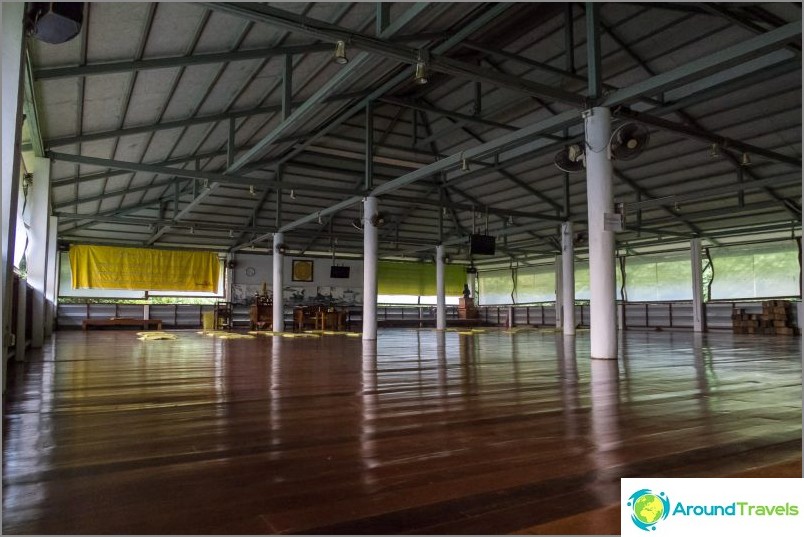
Meditation hall
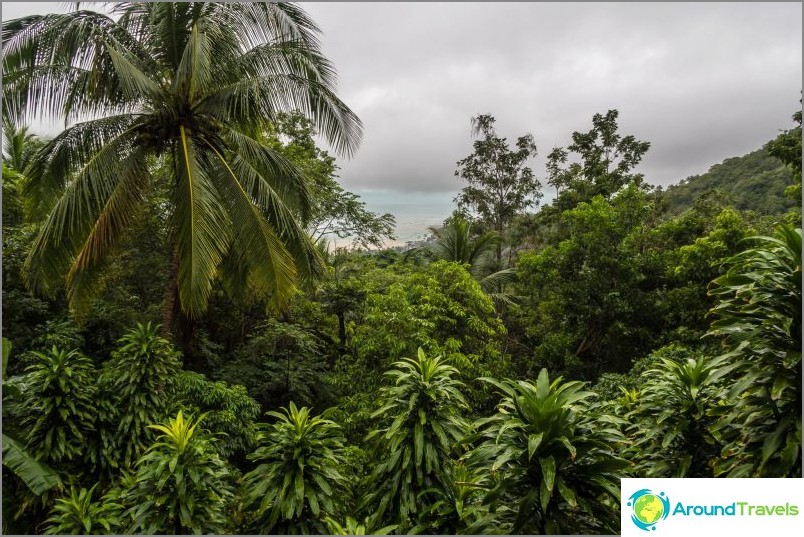
It overlooks the beach, watched while meditating while standing
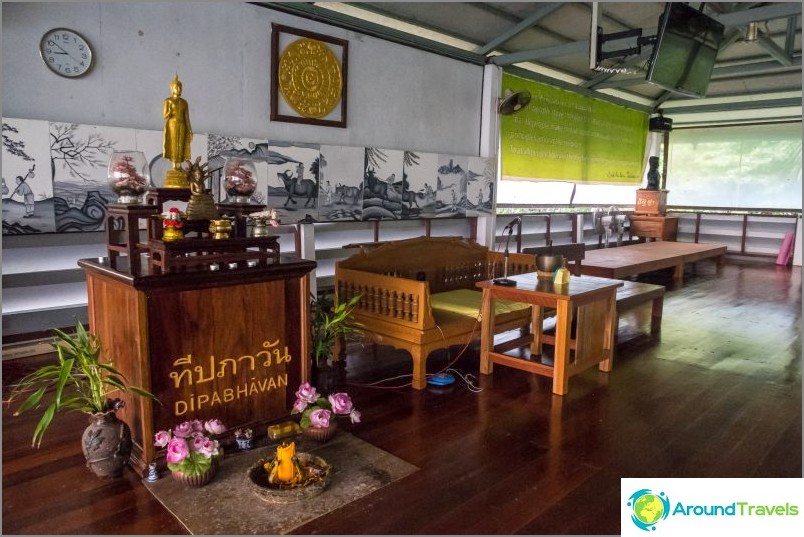
Either a volunteer or a teacher sat here, supporting us with his appearance
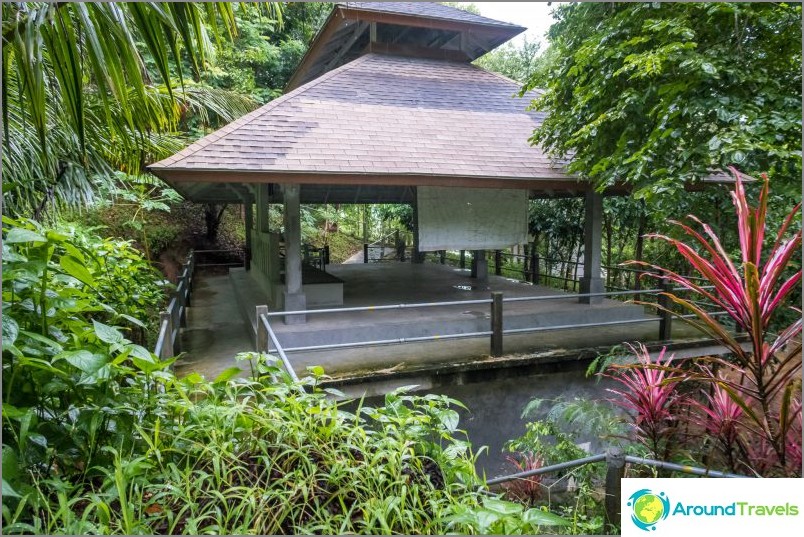
The so-called Russian sala, here you can do yoga in the morning
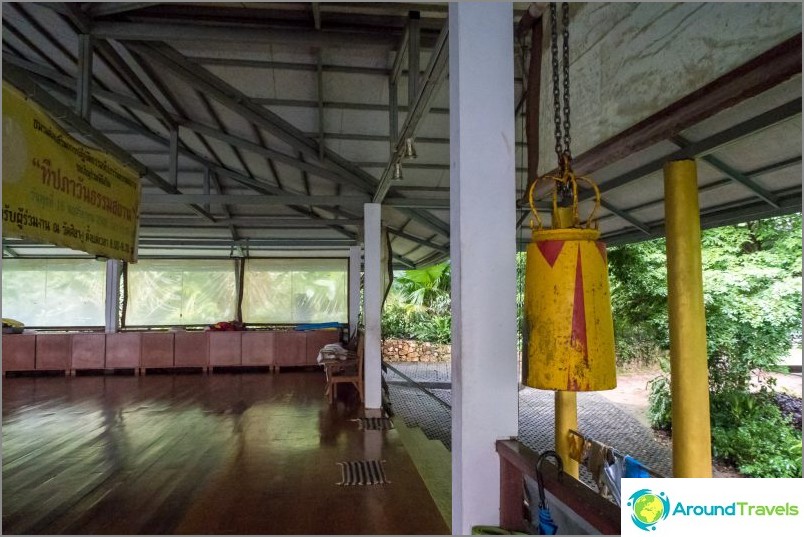
The gong that woke us up every morning
The food was Thai, simple and uncomplicated, as a rule, rice with vegetables (all meals are vegetarian, maximum eggs). Every day they gave 2-3 small pieces of watermelon, a couple of bananas and a dessert from something incomprehensible Thai in a pot. Every time you open it, you look and do not understand what it is. Then you even start eating, and still it is not clear. In general, it was difficult to stay hungry, since you could come up several times and put yourself some more. But 2 times a day, as well as just such a diet, obviously not everyone will like it..
The dishes were washed independently and quite sparingly - in 4 basins: in the first very soapy water, in the second less soapy, in the third and fourth without soap. This is a very amateurish way, squeamish people will not like it at all.
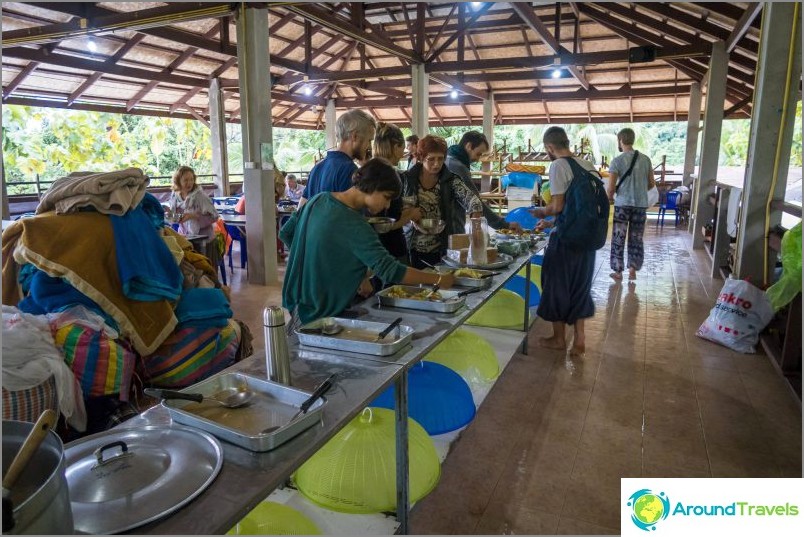
Dining hall and table with food, where everyone comes in turn
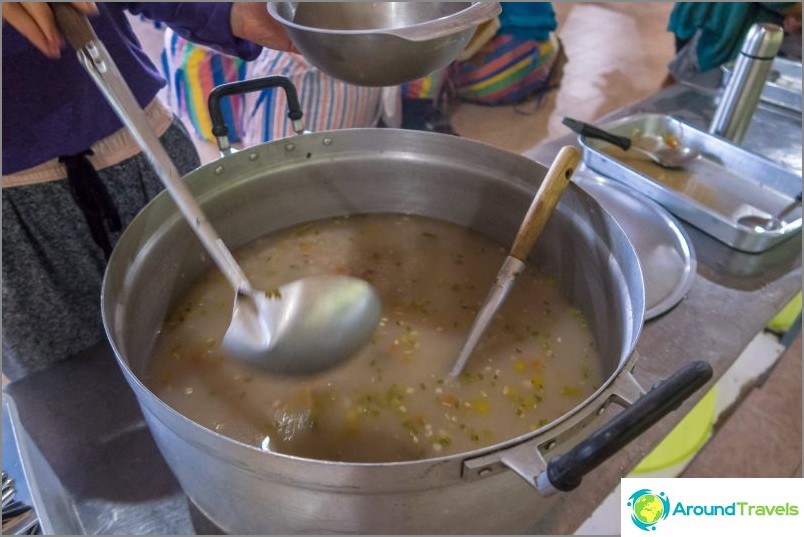
Outwardly nondescript, but delicious rice porridge with ginger
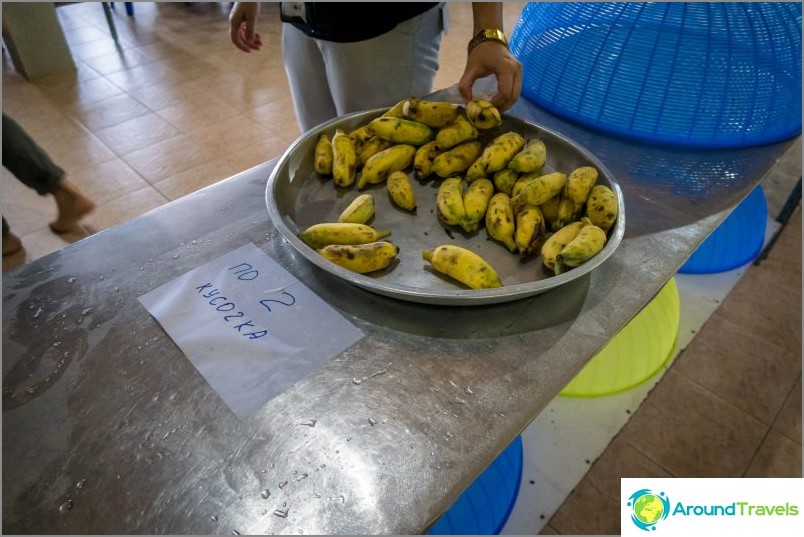
Fruit is always strictly quantity
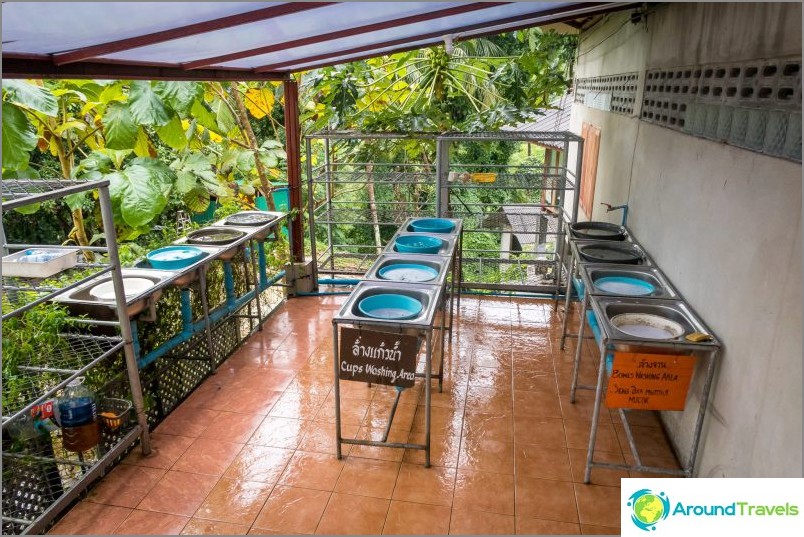
Washing dishes in 4 basins
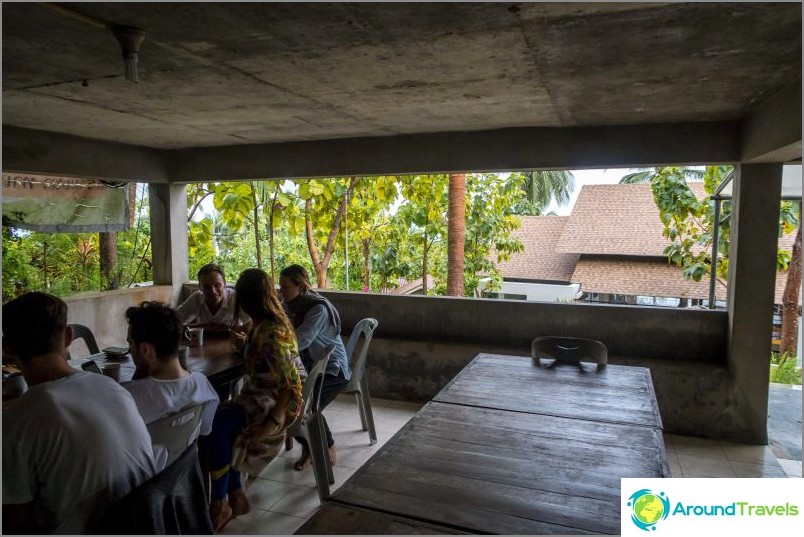
Room for evening tea, and a panoramic TV in the entire wall
We slept on wooden beds on a mat, that is, no mattresses. Whoever had a travel mat or yoga mat with them had a much softer sleep. They gave us a thin blanket to hide, you know, like a fleece blanket. I slept on one half of the blanket, the other half covered myself. It was tough for me, but not cold, the temperature did not drop, it seems to me, below 24-25 degrees.
We washed ourselves with cold water (there are no water heaters), we washed ourselves by scooping from containers to save water. For men, I think, few people had difficulties, but for girls with long hair it was more difficult. The water, of course, is not as cold as in Russia, but not warm, at room temperature somewhere. There was no toilet paper in the toilets, but it could be bought at the store, which most did..
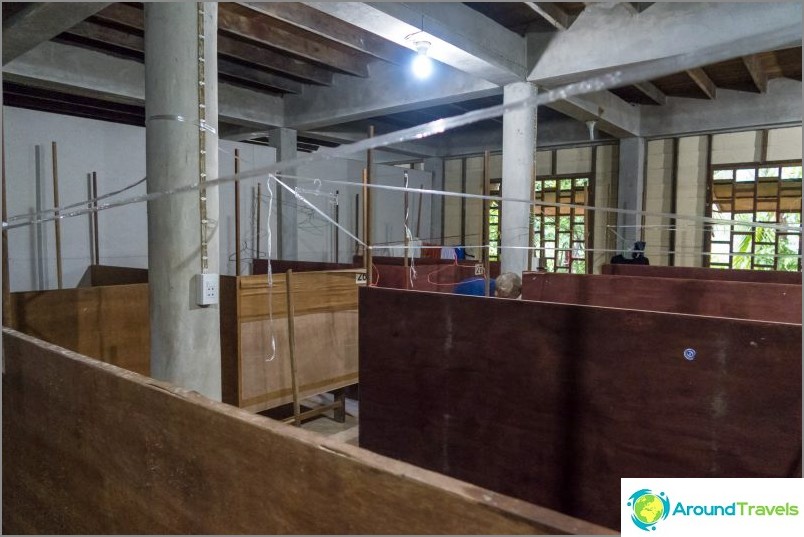
Male dormitory
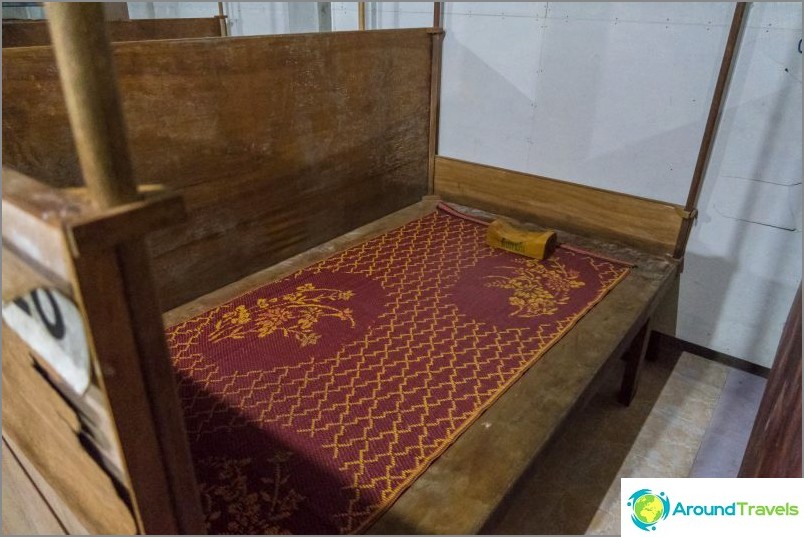
My wooden bed with a mat
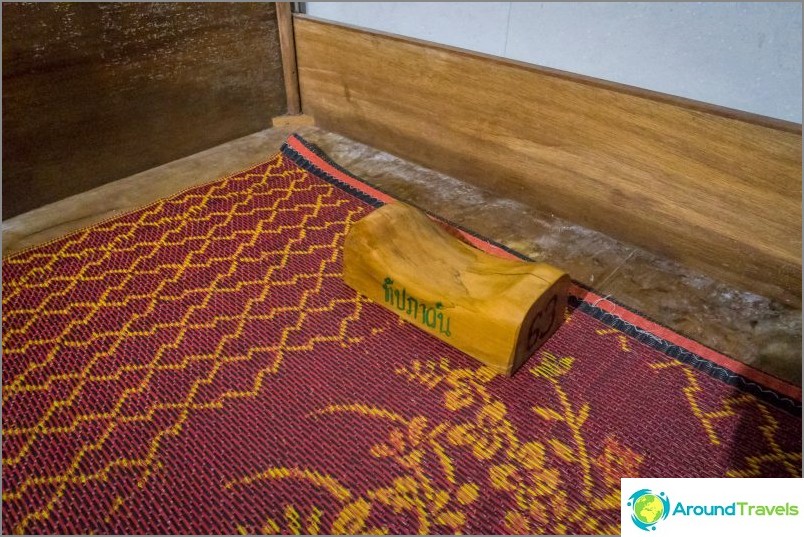
Wooden pillow for the very advanced
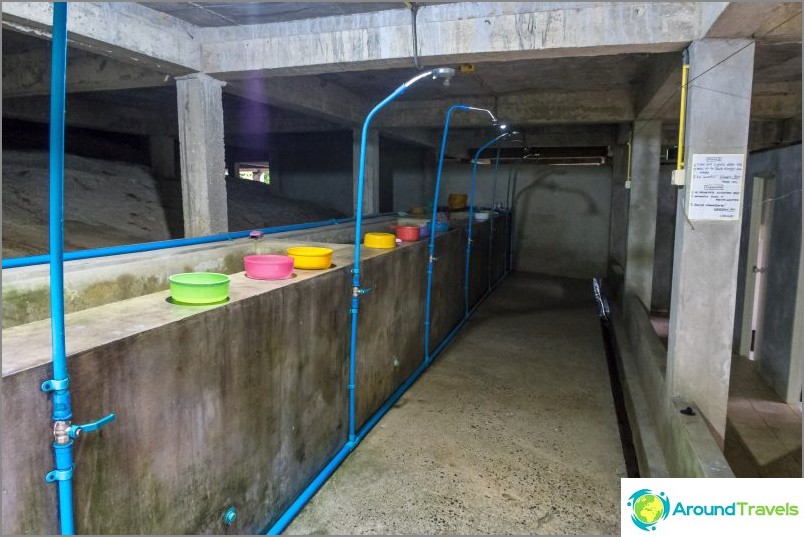
How do you mix «male souls»? 🙂
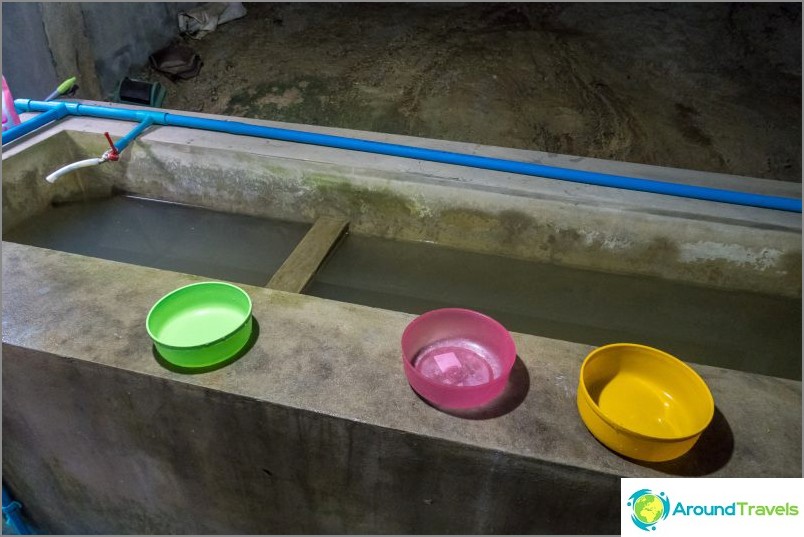
Here they scooped up for washing
During registration on the first day, everyone chose a social work for themselves: sweep the paths, wash toilets, wipe the dishes, wash the floors in the premises, and so on. I got to clean the toilet. Well, there was another option, but for some reason I signed up for the toilets.
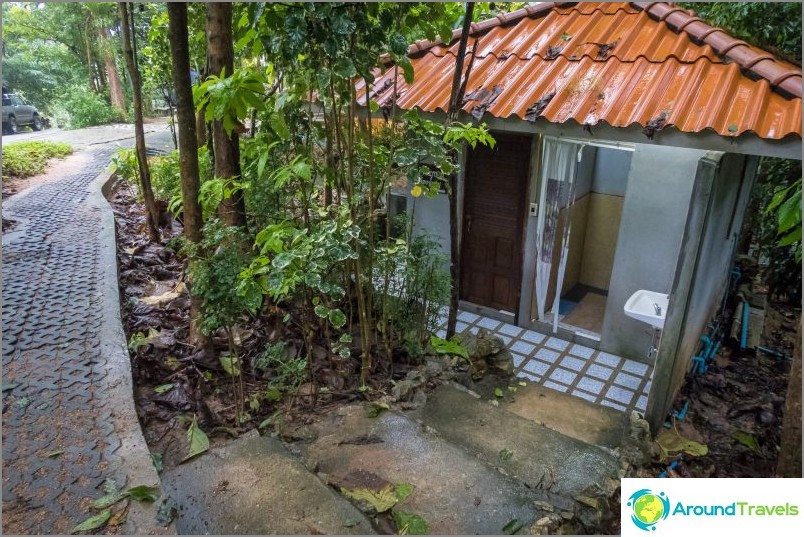
This toilet was washed by me and 3 other people.
On the last 6th day in the evening, we all gathered in the meditation hall and those who wished could go to the microphone and talk about their experiences and impressions. With each new performance, all these closed and unfamiliar people became more and more dear. It really felt like a big family. Well, and of course, it was interesting to listen to who had what results, so that it was the most difficult, what annoyed, what turned out to be the easiest to compare with your feelings. Of course, on the 7th day before leaving, we then talked for a very long time and a lot, sharing our impressions. It's funny, several people told me that I have a very stern face in prostration. I told others the same thing that I was afraid to look and smile. It turned out to be all kind and cheerful people and love to talk. And we thought about others for ourselves.
Briefly about meditation
Meditation is a good practice. It develops mindfulness, develops the mind. Try to monitor your breathing for at least 10 minutes without being distracted by anything. This is such willpower and the ability to concentrate. Our teacher Ajahn Hubert said that the essence of meditation is not in the correct posture, not in motionless sitting, but in the ability to control your mind. That is, so that he does not control us, but we control him. Then we will be able to observe our emotions and decide how much we want to get involved in them, regardless of whether this emotion is negative or positive. Because we usually get involved in emotions uncontrollably and it causes us suffering. We get upset, angry, offended. Meditation can help a person reduce his suffering, teach him to observe his thoughts and emotions without getting involved in them, thereby simplifying his attitude to something. You know, as they often say, you cannot change the situation, change your attitude towards it. At the retreat, I managed to feel very well what this means..
A conscious approach to life is very important, almost more important than meditation itself. In fact, this is the same practice only in everyday life. Be aware of yourself every time in the present moment. Word «real» has 2 meanings in Russian: now and real, standing. therefore «currently» reflects very well the meaning of awareness. After all, we are used to doing a lot automatically, without thinking at all: eating, brushing our teeth, taking the subway to work, kissing a child before leaving home. Perhaps only in some bright moments we are really aware of them. For example, when we see a beautiful sunset, when we climbed to the top of the mountain after a week of travel with a backpack, when we get off the plane somewhere in Bangkok and inhale the smell of our beloved Asia, or when we lay down on a sun lounger on the first day of vacation with a glass of something refreshing in hand and finally relaxed after a year of hard work. Everyone will have their own lucid moments.
But all life consists for the most part just of the current moments and dim moments that we do not notice, while the mind is busy with vanity, thoughts about the past and the future, washing various situations, and so on. As a result, we do not really live, we miss life. Of course, the question is, is it necessary to be aware of such ordinary actions as brushing your teeth? Do not know. But it certainly makes sense to be more attentive to life. At least I figured it out for myself. Especially when we are next to loved ones, when we say something, both pleasant and not so, when we behave somehow in certain situations. Still, life brought to automatism is not life, in it you can go very far from what you originally wanted and planned. And then you look back and uh, and 10 years have passed, and you have not noticed. Moreover, for some reason you were not at all there and did not do that at all. Well there is such a possibility.
You can still write a lot of text here, but I wrote only what seemed very important to me. I think that in a year or so it will be very interesting to re-read this post..
My impressions and experiences
This was my first meditation experience. This is how to do it on purpose. Similar things happened just in life, for example, hiking meditation during a long and physical exertion, or when you drive a thousand kilometers in one sitting, but this is not something, not a retreat. By the way, a big role was played by the fact that I was not alone, but there were many of us, quietly we supported each other. You see everyone is sitting around, not moving, and it becomes a little easier for you to continue. In general, it was a very interesting experience. In some ways it is difficult, in others it is not. I'll try to tell.
As early as day zero, I was overcome with doubts as to why I came here and who these people are. It’s not straight that I would like to run away, but the thought that I have a lot of work and things to do there, I could just sit quietly at the computer for a week, and not here to retreat. Until about the 3rd day, the thought that you can leave did not leave. It's good that there was a firm intention in my head to reach the end. After the equator, it became easier, and on the last day it was even a little sorry that everything was already over..
Surprisingly, the ascetic and uncomfortable conditions did not cause my irritation or any difficulties at all. Not comfortable, but not difficult. Perhaps the experience of hiking, sleeping in a tent and eating a simple meal, and budget travel in Asia with overnight hostels prepared me for this. Some participants said that it was really very difficult for them. Still, feeding 2 times a day with very simple food and a night on a piece of wood are far from sanatorium conditions. Although it should be noted here that our retreat is still a light version, since usually the whole action lasts 10 days, eating only once a day, almost no lectures and 10 hours of meditation a day. We had about 6 hours of meditation..
Probably the only thing that bothered me was the daily rain. Everything was wet, the washed clothes did not dry out, but rotted, the walls of the bed were covered with white mold, the feet were constantly damp, as you walk through puddles in shale. And yes, I wanted cookies! Well, or something sweet for tea. Stupid habit. On the first day they were given to us for lunch and I thought they would continue to give them, but on the third day it became clear that tea with a banana was our everything. And from physical inconveniences - I could not get enough sleep, such early waking up was difficult. The first few days I also slept during all the breaks, then it became easier.
But the most difficult thing for me was the practice itself. I can't imagine how you can sit for hours and watch your breathing. Anapanasati is a technique when we follow the inhalation and exhalation (you can follow the physical sensations of the passage of air), without distracting our mind. It's just hell! My mind was constantly bored and lost in thought. I could go into thought for five minutes, and only after that I remembered that I was following my breath. I sat and waited until they finally hit the gong and I could do something else. Most of all I liked the lectures, at least some food for the mind.
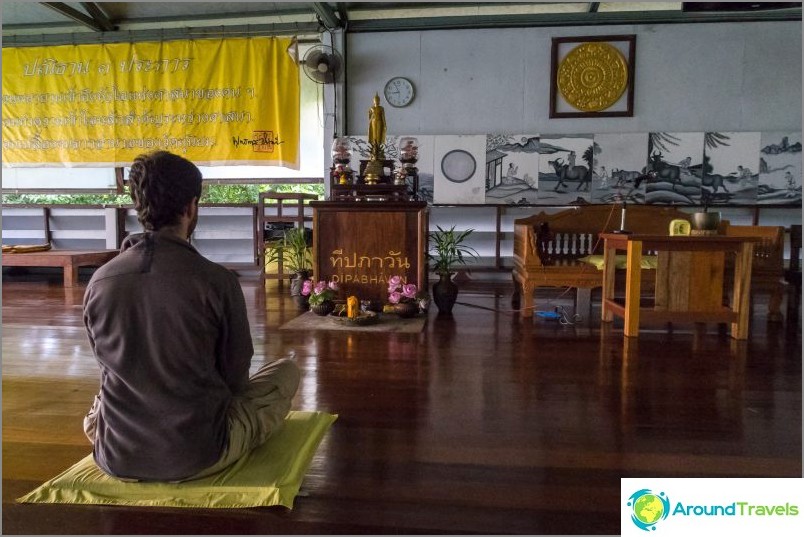
This is how I had to sit for 6 hours a day.
As a person accustomed to the eternal online and the Internet, I need almost round-the-clock consumption of information. It was very difficult in this information vacuum. You can't read, talk too, there is nothing interesting around. I remembered who was sitting where, remembered clothes, paid attention to who had what pedicure and rings on their feet, to the color of the leaves of the plants around, to the drawing of the steps by the stairs. And to lie down to think before going to bed or during a break has become my every occupation. After all, it was also undesirable to immerse yourself in thoughts, ideally to practice all the time.
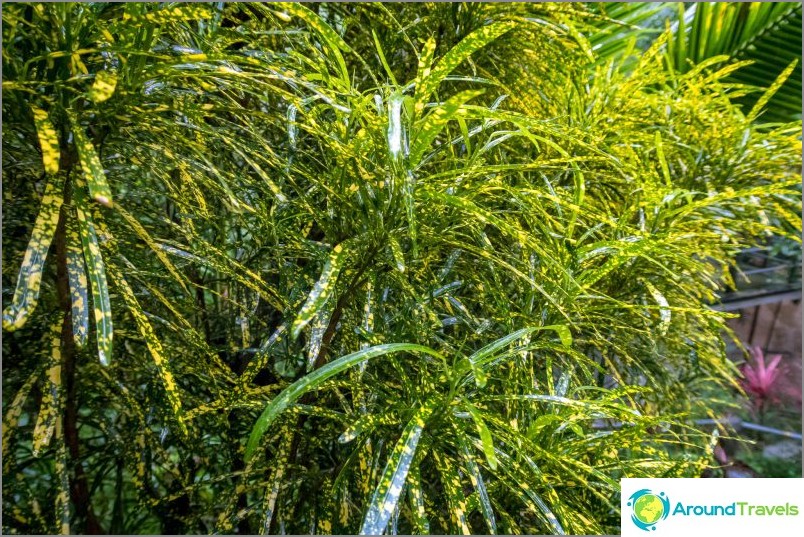
I remember this colorful bush very well
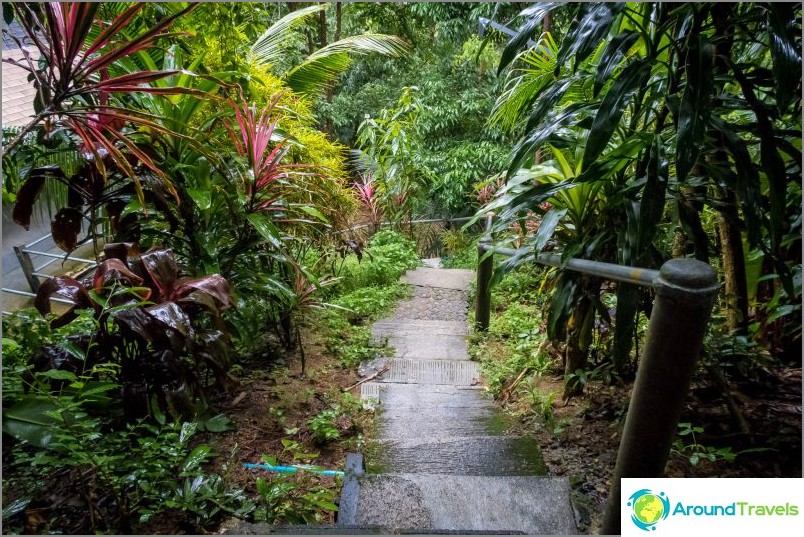
Staircase leading to the dining room
Day 5 was the toughest. There were no lectures, only meditation. And on that day, probably for the only time in the entire retreat, I managed to stay focused on thoughts for quite a long time and I fell into some kind of black something. Not for long. But the sensations are interesting. As if from the inside (or from somewhere else) you look at everything around, practically not feeling your body, but at the same time easily controlling your breathing. It's hard to describe. It's a pity, the gong was struck and I instantly fell out back.
But it turned out to be easy to be silent. Quite. I was surprised by this too. I didn't think that 7 days in silence is so easy. On the other hand, I am an introvert and do not need constant communication. True, when the ban on silence on the 7th day was lifted, I just suffered, so many emotions, so many I wanted to share. After a couple of days, it let go, the emotional upsurge ended and even a slightly decadent mood in contrast began. But then everything became even, the pendulum ended.
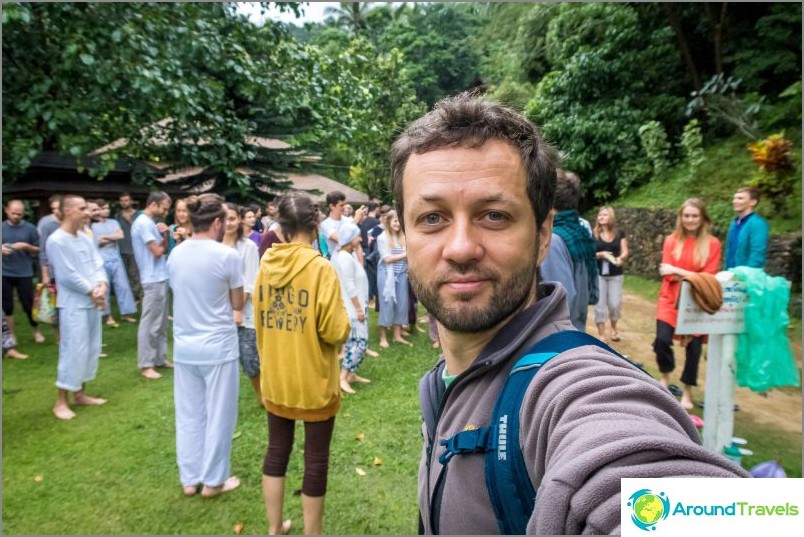
There are a lot of positive emotions on the last day.
If we talk about whether meditation helped, then as our teacher Ajahn Hubert said, you need to look at the results. In my case, they are that during the retreat and now - the mind became much calmer. It is less worn out and fussed about. But it is clear that this is a temporary phenomenon and the effect will soon fade away. Therefore, ideally, continue to practice for at least 10 minutes a day. Again, as Ajahn Hubert said, it is better for 10 relaxed minutes a year to get into the habit than meditating for an hour, but the enthusiasm is enough for only a couple of weeks. In general, given that I had no expectations at all from this event, they were justified more than.
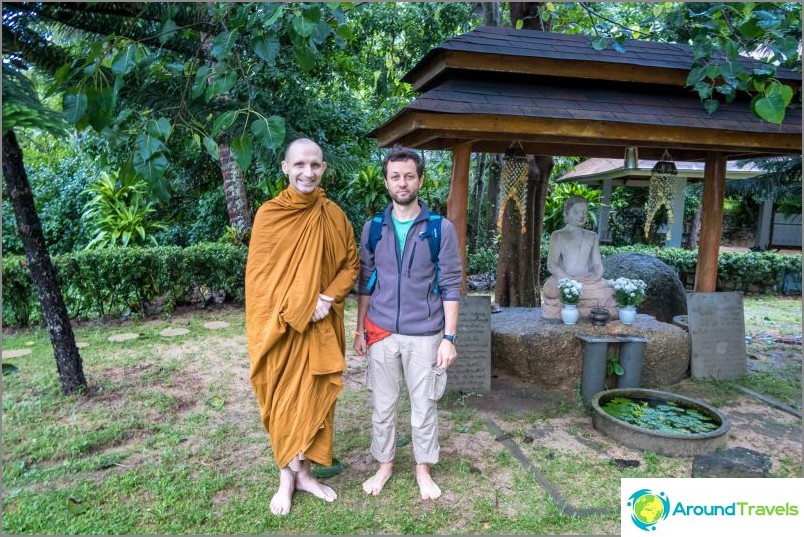
Me with Ajahn Hubert
You are probably wondering if I will be practicing meditation? I dont know. I also don’t know if I’ll go to the retreat again. It's too early to talk about it. Actually, you know, I liked the idea of a conscious approach to life, when in everyday life you show more care. If at least I can implement it, then it's already great. I would also like to note that the retreat did not make me different, I stayed the same. It is very unlikely that meditation for several days can change a person, rather he can understand something for himself or see something in himself, and even that is not a fact. Well this is to my friends' questions, «well how?», «brightened?», «what insights came?».
On the map
Just in case, I will add a map, although if you are going to a retreat, you will be met near the Utopia Resort hotel or The Icon building. The letter after registration for the retreat will contain all the necessary information.
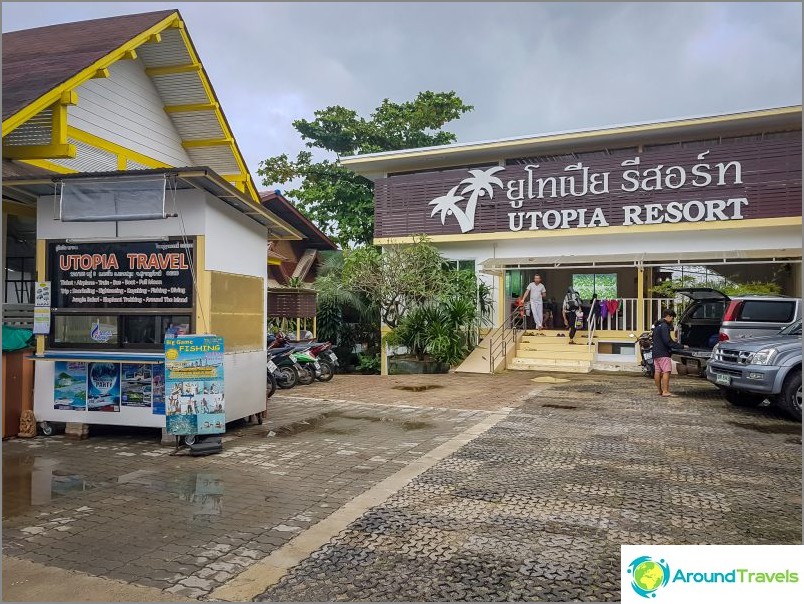
Transfer from this hotel to Dipabhavan
Dipabhavan Meditation Center
Dipabhavan Meditation Center
This center holds English and Russian-language retreats. I was on one of them.
More details.
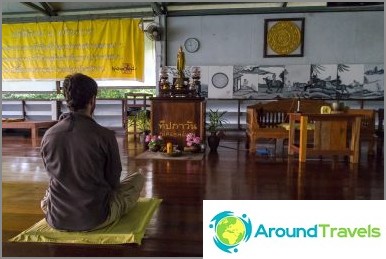
This center holds English and Russian-language retreats. I was on one of them..
P.S. Something long post turned out, but in fact, he did not tell everything. Ask questions if you are interested in something. By the way, the fate of Russian-language retreats on Koh Samui is still in question. Ajan Hubert leaves for Latvia.
